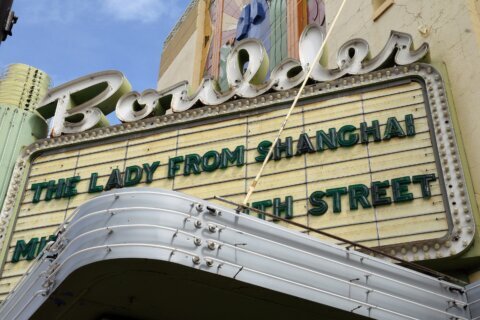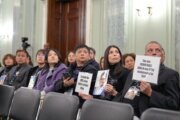WASHINGTON — Enjoying a comedy depends on the folks around you. If you’re flocked by friends, you’ll crack up. If you’re beside humorless strangers, it hampers the experience.
That’s sadly what happened during “The Hitman’s Bodyguard,” as Debbie Downer to my left and Party Pooper to my right didn’t laugh once — despite the rest of the crowd howling.
Moral of the story: choose your audience wisely; otherwise, it’s awkward as a “motherf***er.”
That’s the recurring phrase in this action-comedy, a juicy buddy flick that’s surprisingly funny on a gut level, but one where the plot is so clearly lazy that responsible critics will instantly downgrade the experience. What’s left is a flick that shines on an escapist level but little else.
The story follows world-renowned bodyguard Michael Bryce (Ryan Reynolds), who’s down on his luck after the assassination of a Japanese dignitary. One day, he gets a new client in hit man Darius Kincaid (Samuel L. Jackson), who’s slated to testify at the International Court of Justice in The Hague during the trial of European dictator Vladislav Dukhovich (Gary Oldman).
Thus, the duo must learn to work together en route to their trial date. To steal from “My Fair Lady” (1964), they kick up a rumpus and lose the compass, but they get to the court on time.
Both Jackson and Reynolds have built up cults of personality from loyal fans in recent years, transitioning from more serious beginnings — Jackson in “A Time to Kill” (1996), Reynolds in “Safe House” (2012) — to find second-act career resurgences in over-the-top, self-aware niches — Jackson in “Snakes on a Plane” (2006) and Reynolds in “Deadpool” (2016).
Thus, devoted believers in The Church of Jackson & Reynolds will eat up their banter and physical gags from start to finish, roaring each time Jackson spits a well-timed F-bomb. At one point, Reynolds actually quips, “This guy single-handedly ruined the word ‘mother****er,'” a sentiment some critics might hold. Nonsense! It’s Jackson’s glorious place in movie history.
We also get Jackson’s trademark spiritual moralizing, evoking his “shepherd” speech at the end of “Pulp Fiction” (1994) about “the tyranny of evil men.” In “The Hitman’s Bodyguard,” he insists that his deadly assassin job is paved with good intentions by only killing sinister folks, pondering a similar question: “Who’s worse? He who kills evil men, or he who protects them?”
While the delicious dialogue likely blends improvised banter with zingers by screenwriter Tom O’Connor (“Fire with Fire”), the plot sadly doesn’t elevate to the same level. It becomes obvious early on that this screenplay is focusing more on the jokes than the story, which becomes very silly very quick during action sequences, namely a chase with a fake-looking speedboat.
Even so, these action set pieces would be passable diversions in an escapist genre, except for the fact that they’re surrounded by larger missed opportunities by the writer. Gary Oldman is one of the finest acting talents we have going today, but his gifts are squandered by a villain who is barely on screen, left waiting in a trial at The Hague rather than actively interfering.
A similar fate befalls Reynolds’ on-screen girlfriend, Interpol agent Amelia (Elodie Yung), who only appears for brief phone calls (“I’m sorry,” “I love you”) while waiting for him to arrive at the trial. It takes more to create action romance than naming your characters Kurosawa (i.e. “The Seven Samurai”) and Kincaid (“Bridges of Madison County”). It takes actual screen time.
Most disappointing in this regard is Kincaid’s barely-seen wife Sonia, played by the spitfire Salma Hayek, who is gifted at mining feminist comedy from stereotyped sex appeal. Hayek steals the movie in a brief flashback showing how she and Jackson met in a cantina, one of the film’s most memorable scenes as she decimates beefcakes for their unwanted advances.
But while Hayek is effective, the presentation is lazy, leaning heavily on the crutch of slow-mo flashbacks paired with obvious pop tunes, from Lionel Richie’s “Hello” to Foreigner’s “I Want to Know What Love Is.” These aren’t unique song choices precisely timed with stylized action like in “Baby Driver” (2017); they’re blanket fillers that run counter to the background chaos, a winking trick that’s been done to death lately, namely in “Guardians of the Galaxy 2” (2017).
It’s all part of a flashy tone with snazzy split-screen graphics and helicopter shots over lavish skyscrapers, as composer Atli Örvarsson (“Vantage Point”) wails James Bond-style horns. It’s all a bit much, feeling like style over substance by director Patrick Hughes (“The Expendables 3”).
Still, Hughes deserves praise for one killer sequence. It begins by cutting from a fiery crash to a flame-broiled burger, as Reynolds barges into a kitchen. Chased by baddies in a frantic single-take, they move into what looks like a hardware store, using tools as weapons of choice: axes, staple guns, chains. It’s a rare moment where the film really comes to life.
You’ll wish there were more such inspired sequences throughout. Instead, it mostly feels generic. There really isn’t anything you haven’t seen before: Chris Tucker & Jackie Chan in “Rush Hour” (1998), Eddie Murphy & Nick Nolte in “48 Hrs” (1982) or Danny Glover & Mel Gibson in “Lethal Weapon” (1987). Actually, it feels more like Jackson’s spoof “Loaded Weapon 1” (1993), except “Hitman’s Bodyguard” can’t decide whether it’s dabbling in parody or reality.
Don’t despair, it’ll still make you laugh — just make sure you watch it with the right crowd.








